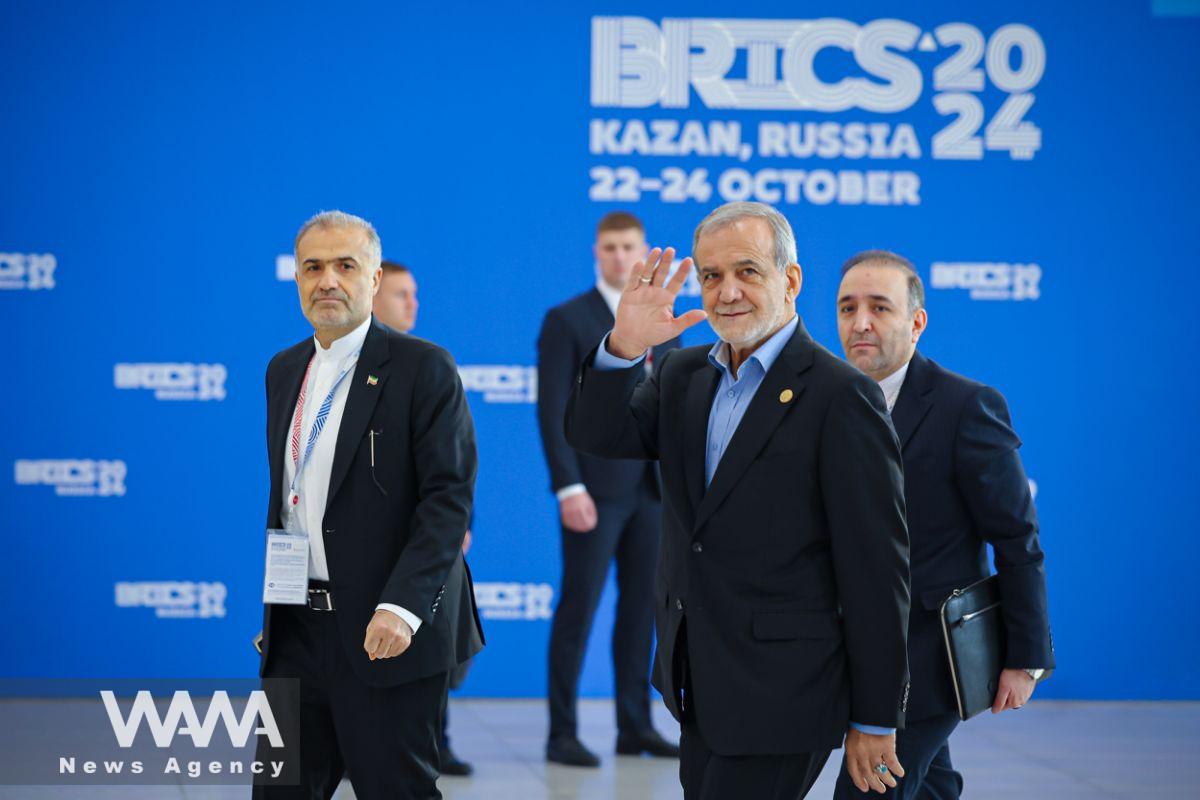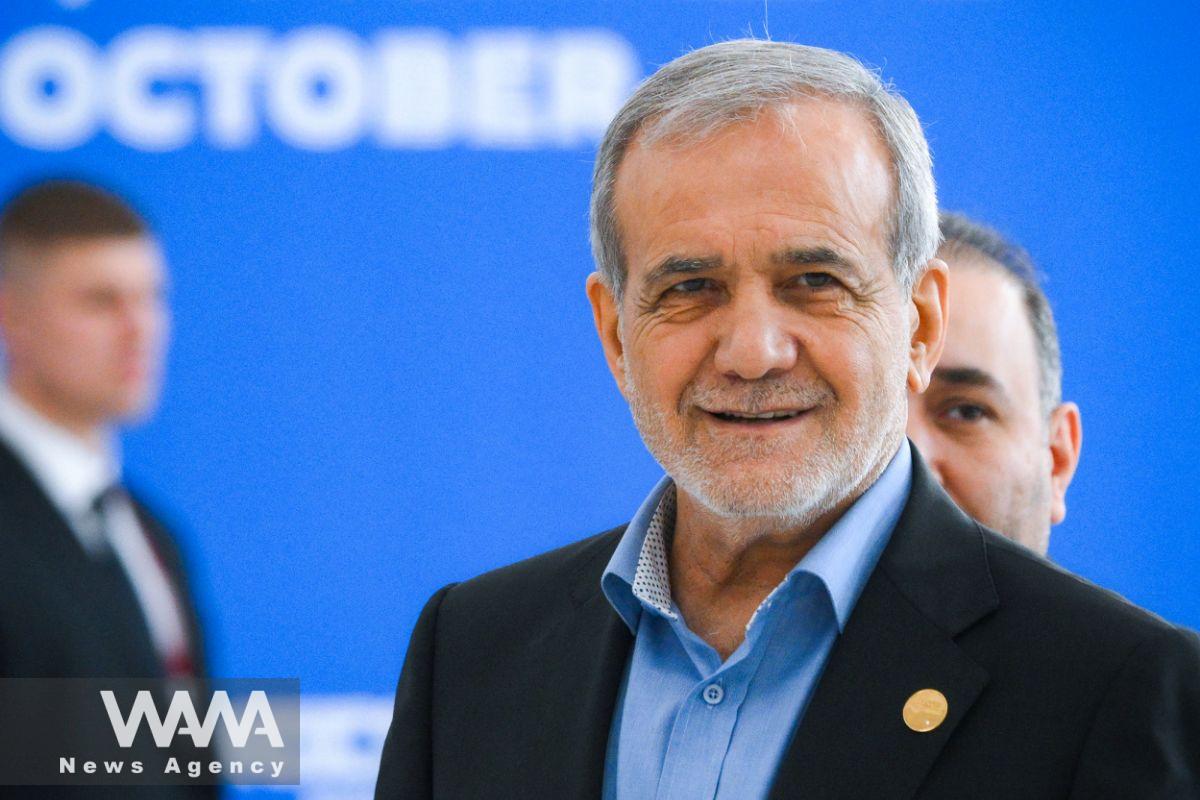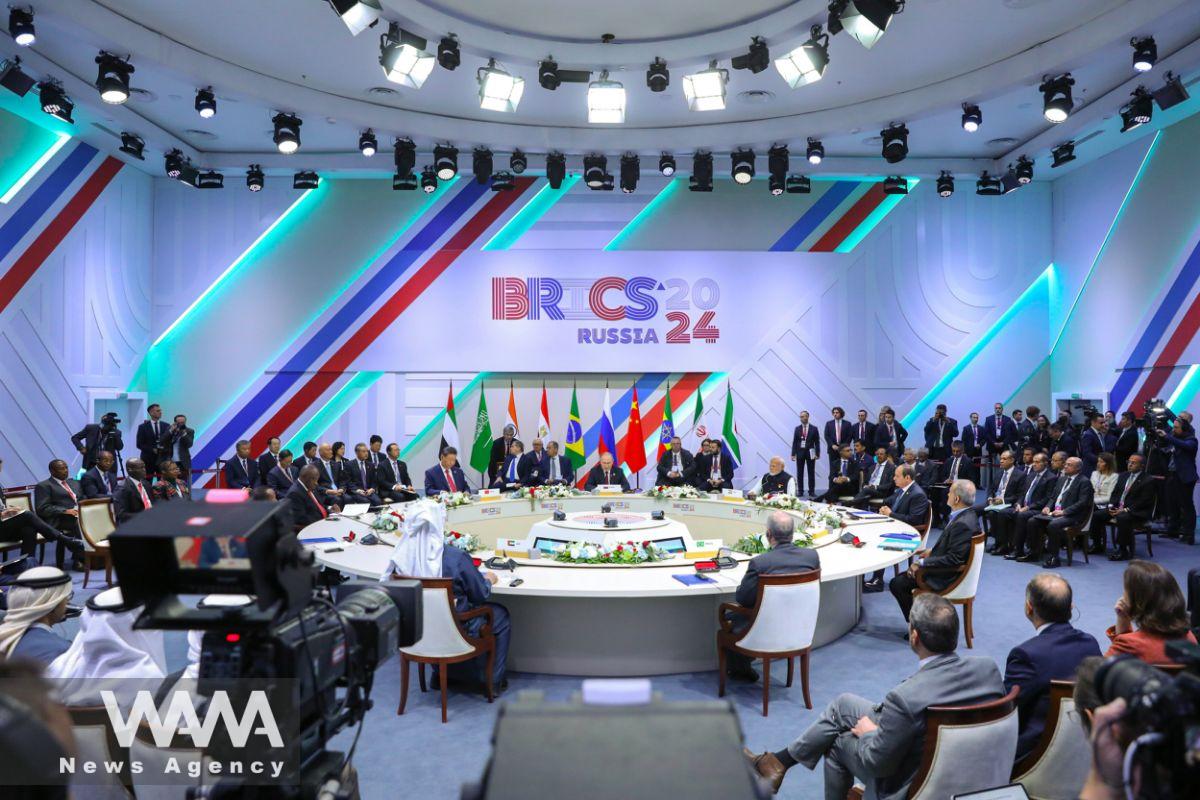Five Key Proposals from Iran for BRICS Leaders
WANA (Oct 23) – In a key address at the BRICS summit held in Kazan, Russia, Iranian President Massoud Pezeshkian emphasized the potential for mutual cooperation between BRICS and Iran.
He presented five significant proposals aimed at achieving the goals of this international organization, stating that pursuing diverse internal programs within the group would be challenging without a small and agile secretariat.
During his speech on Wednesday, Pezeshkian highlighted that BRICS has substantial and crucial objectives in the political-security, economic-financial, and cultural-people sectors.
He asserted that BRICS has demonstrated its future significance in political dynamics and related transformations through its collective performance. He described BRICS as a prominent model of successful collaboration emerging from the Global South, attracting many countries.
Pezeshkian also noted the rapid changes in global developments and threats to peace and human security in the West Asia region. He expressed optimism about the significant steps taken over the past year to resolve international and regional crises, citing the extraordinary BRICS summit focused on the Gaza issue and various meetings at the level of deputy foreign ministers as examples of effective collaboration that have yielded positive outcomes.

The sixteenth main summit of BRICS leaders was held in Kazan, the capital of Tatarstan, Russia, with the presence of Dr. Massoud Pezeshkian, President of the Islamic Republic of Iran, on October 23, 2024. President.ir/ WANA News Agency
Iranian President Massoud Pezeshkian emphasized the need for an immediate and permanent ceasefire concerning the situations in Palestine and Lebanon. He called for the complete withdrawal of occupying forces from seized territories and the urgent delivery of aid to the people of Gaza and Lebanese refugees.
Pezeshkian highlighted the challenges faced by the Global South, which is struggling with inequality, injustice, and economic difficulties. He stated that the current generation and future ones would assess the success of BRICS based on quantitative metrics, levels of development, and improvements in economic growth indicators.
During his address, Pezeshkian outlined several proposals, noting the recent meetings and diverse programs involving ministers of economy, finance, trade, energy, and central bank governors. He urged prioritization of economic and financial issues in the upcoming year while ensuring that political-security and cultural-people aspects remain in focus.
He called on all public and private institutions within their respective countries to accelerate efforts in fostering interconnected economic and trade collaborations, leveraging the capabilities of BRICS.
In his address regarding his second proposal at the BRICS summit, Iranian President Massoud Pezeshkian emphasized that one of the significant challenges unilateral countries impose on independent and freedom-seeking nations is economic sanctions.
He noted that years ago, the number of sanctioned countries was barely in the single digits, but now millions of people across dozens of countries have become targets of sanctions in a process that is illegal and violates human rights.
Pezeshkian stressed that countering illegal sanctions requires collective action and the implementation of joint mechanisms. He expressed appreciation that BRICS has repeatedly voiced its opposition to sanctions, with clear reflections of this stance in the Kazan Declaration and other documents. However, he asserted that to prevent any country from daring to sanction others in the future, it is essential to take practical and calculated steps.

The sixteenth main summit of BRICS leaders was held in Kazan, the capital of Tatarstan, Russia, with the presence of Dr. Massoud Pezeshkian, President of the Islamic Republic of Iran, on October 23, 2024. President.ir/ WANA News Agency
In presenting his third proposal, Pezeshkian pointed out that most countries around the world are dissatisfied with the United States’ use of the dollar as a weapon to solve its domestic and financial problems.
He remarked that the world recognizes BRICS as an entity striving to reduce the power of the dollar and increase trade in national currencies. These efforts, along with the launch and utilization of digital currencies and the establishment of new financial mechanisms and technologies such as messaging systems, align with the main objectives of BRICS.
Iranian President Massoud Pezeshkian underscored the significant advantages of BRICS member countries, noting that they are not only the largest producers but also the biggest consumers of energy, food, and other goods. He emphasized that their access to key transportation and transit routes facilitates trade in national currencies.
Addressing his fourth proposal, Pezeshkian pointed out that northern countries have historically obstructed southern countries’ access to new technologies. He stressed the necessity for BRICS nations to collaborate through information exchange, joint investments, and other actions to equip themselves with modern technologies.
In discussing his fifth proposal, Pezeshkian highlighted the importance of strengthening the New Development Bank (NDB), one of the institutions emerging from BRICS. He called for the acceptance of new members and an increase in capital to enable the bank to support the infrastructure development of member countries. He stated that the Islamic Republic of Iran is ready to engage in close cooperation with this bank.
Pezeshkian noted that Iran possesses considerable capabilities across various sectors and is eager to foster joint and mutually beneficial collaborations within BRICS, expressing a willingness to exchange experiences and showcase the country’s achievements.

The sixteenth main summit of BRICS leaders was held in Kazan, the capital of Tatarstan, Russia, with the presence of Dr. Massoud Pezeshkian, President of the Islamic Republic of Iran, October 23, 2024. President.ir/ WANA News Agency
Iranian President Massoud Pezeshkian emphasized the Islamic Republic’s strategic position as a vital corridor for several international transport routes, including the North-South and East-West corridors. He expressed optimism that by developing constructive cooperation, a new network of transit relations could be established within BRICS for the transfer of energy and commercial goods.
Pezeshkian noted that pursuing a wide range of internal group programs would be challenging without a small and agile secretariat. He proposed that the establishment of this secretariat be placed on the agenda of foreign ministries.
In closing, he extended his gratitude to President Vladimir Putin for the successful hosting of the summit and congratulated Brazil in advance for its upcoming presidency next year.
Pezeshkian expressed hope that in the new term, BRICS would witness strengthened friendships and a new chapter of cooperation aimed at achieving the group’s goals and completing processes related to collective interests.












